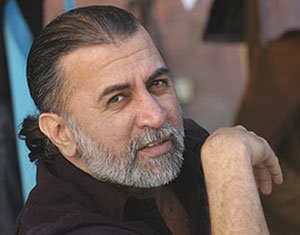
"In any free society, the single greatest challenge remains policing power and money."
So says Tarun Tejpal, editor-in-chief of the Indian news magazine Tehelka. As the leader of an independent, investigative publication in a country where corruption and inequality abound, Tejpal understands the costs of that challenge better than most.
Since it launched in March 2000, Tehelka -- an Urdu word that loosely translates to "sensation" -- has published widely read exposes, whether about match-fixing in cricket or on the Gujarat riots. Just a year into Tehelka's existence, its journalists broke Operation West End, an investigative piece that exposed corrupt dealings within the world of Indian defence procurements.
That bombshell, according to Tejpal, had major impacts. India's defense minister resigned, and a commission of inquiry was set up to investigate the magazine, which Tejpal says shut Tehelka down for nearly two years.
"It was a very dark and difficult time, but I don't regret it because it was the finest education I could've received in the business of democracies, and the true nature of the beast that is India," he said.
While Operation West End made Telhelka "inordinately famous," says Tejpal, it's an ongoing battle to stay afloat. At a talk in Vancouver last week, he spoke about the challenges of running a magazine that consistently blows up the status quo.
Recently, The Tyee sat down with Tejpal to talk about Tehelka's triumphs and struggles. Here is more from that conversation, including how Tehelka provides the "tentacles of empathy" that unite India's rich and poor, and the need for mavericks in journalism.
On the inspiration to start Tehelka:
"I was the managing editor of Outlook, the magazine I'd started along with a few others. Around that time, I was fatigued with how little journalism was being able to do. In the 1990s, India had witnessed a great boom in electronic journalism and in society journalism, and there was a sense that the true purpose of journalism was being lost in the country of India.
"I put together this concept for India's first seamless journalistic online platform, and went and pitched it in Bombay to an investor, and almost the first guy I pitched it to was excited. Eventually somebody else backed it, but clearly there was traction for the idea. So we raised a very small amount of investment to start Tehelka.com. I think it was less than a million dollars.
"At the beginning, because I was the first senior journalist who was making the move from old media to new media, there was a big deal of interest in what we were doing. Rather immodestly, I said at that point that Tehelka would try and bring back the hard, adversarial kind of journalism of the 1980s. We would speak truth to power."
On how Tehelka serves India's elites by reporting on India's poor:
"At the end of the day, we are not a first world society, where wealth has fundamentally trickled across the board and basics have been provided for. We are still a country where 500 million people still scramble for education, health care, basic nutrition. You cannot have an elite that has cut itself off from the story of its own dispossessed and deprived people. The engines of any society are controlled by the elite, and the elite has to make a lot of very, very valuable judgment calls that will seed the shaping of societies.
"The founding fathers of India were all men who were born with privilege and from the elite, but they created India with the idea of an equitable and just nation. A modern, secular liberal democracy. That instinct for serving the needs of the weakest and the poorest cannot be lost by the elite. And one of the means of keeping that instinct lubricated is to make sure that we bring across the news of those who are not obviously on their radar. We're tentacles of empathy for them, among the elite."
On balancing the interests of funders and independence:
"Tehelka's done a mountain of work on issues that very few people have worked on. And we are not a commercially attractive proposition at all. So clearly, I've been cunning enough to persuade men with money to part with their money and support something that is not really in their interest. I'm unabashed about it.
"If you don't make profit, you die. It's as simple as that. You need to work your bottom line, and everybody tries to do that. Is there any kind of publicly funded independent media? No. It's all privately owned or invested in India.
"At the end of the day, there will be no perfect space from which journalists can do this great, pure journalism. There's no such space anywhere in the world. At the end of the day, we all live in a complex world, ratcheted along many contesting interests. There are interests of power, there are interests of money, there are interests of media. All of that is happening at the same time.
"If I fantasize about arriving at this pure space from which I can grandstand to the world and do this great work, it's not going to happen. So you have to walk the line. You have to manage corporations, you have to manage political power, you have to manage public expectations. In all of this, as you walk the line, you will have to do the work that you've mandated for yourself. And that's a challenge for any editor or leader in the media."
On the need for funders with conscience:
"What we would love is men of money with conscience. It's not to knock money; I think money is a great thing and entrepreneurship is a great thing. I keep saying entrepreneurship shapes the world, the world is created by entrepreneurs. The planes we fly on, the medicines we consume, the cars we drive, the houses we live in, these are all products of entrepreneurship. It's something to be applauded and praised. I think what one contests is the fact that there cannot be a situation where entrepreneurship exists without a clear idea of conscience and the greater good, and that's what we try to do.
"When I try and look at it in a structural way, in an international or global sense, I think the only real answer is in endowments and trusts that free up journalists from the obvious pressures of corporations and advertising. It needs a great deal of enlightened money and power to help pay those endowments. If they can be done, they will prove to be far more potent than most media companies or journalistic companies today are. If you could create three dozen endowments around the world which funded independent journalism and are not dependent on corporate advertising, I think that would remarkably alter the discourse in nations across the world."
On journalism's warriors and mavericks:
"It's easy to make textbook cases of these gorgeous journalistic warriors, who are set against the power and money, and waging a battle against them. It's a nice tableau, and we shouldn't lose that altogether. At the same time, we must understand that journalists are also human beings, who want the best school for their children, who want a fine house by the lakeside or off in the mountains, who want a kind of fancy car.
"Nobody works as an island. Journalists are really closely ratcheted to the world they work in. It's the maverick that cuts through, that does the really blazing work. Fundamentally, the majority of journalism is status quo, and we have to bank on the maverick, the guy who comes out of nowhere, who has the least to lose. I'm a little more comfortable with that character.
"You can't create structures to produce mavericks. Mavericks happen. The challenge of society is to create structures that allow quality journalism to emerge. (The question is), how do I maintain that maverick quality in a structured way?
"Given all that, our best case really is that ... we never lose sight of what our true role is -- to provide a correction to the abuses of money and the abuses of power. And provide fundamentally, at least in India, two things: justice and equity. Those are the two backbones."
On Tehelka's triumph:
"Most media organizations are status quo-ist, but I don't necessarily mean that as a deep criticism. I mean that fundamentally existing within prevailing dominant structures, they in some sense feed off them, and feed into them. It's not as if they're something apart.
"It then becomes a maverick act to bust the status quo. What was in a sense exciting for me was to try and understand whether structurally, you could create organizations which had in their DNA the obvious suspicion of the status quo. I think Tehelka has that.
"My triumph is that I've created an organization where even if I'm missing, and I'm in Vancouver giving interviews, the guys are out there ticking away with the same kind of metabolism -- asking uncomfortable questions, blowing the whistle." ![]()
















Tyee Commenting Guidelines
Comments that violate guidelines risk being deleted, and violations may result in a temporary or permanent user ban. Maintain the spirit of good conversation to stay in the discussion.
*Please note The Tyee is not a forum for spreading misinformation about COVID-19, denying its existence or minimizing its risk to public health.
Do:
Do not: